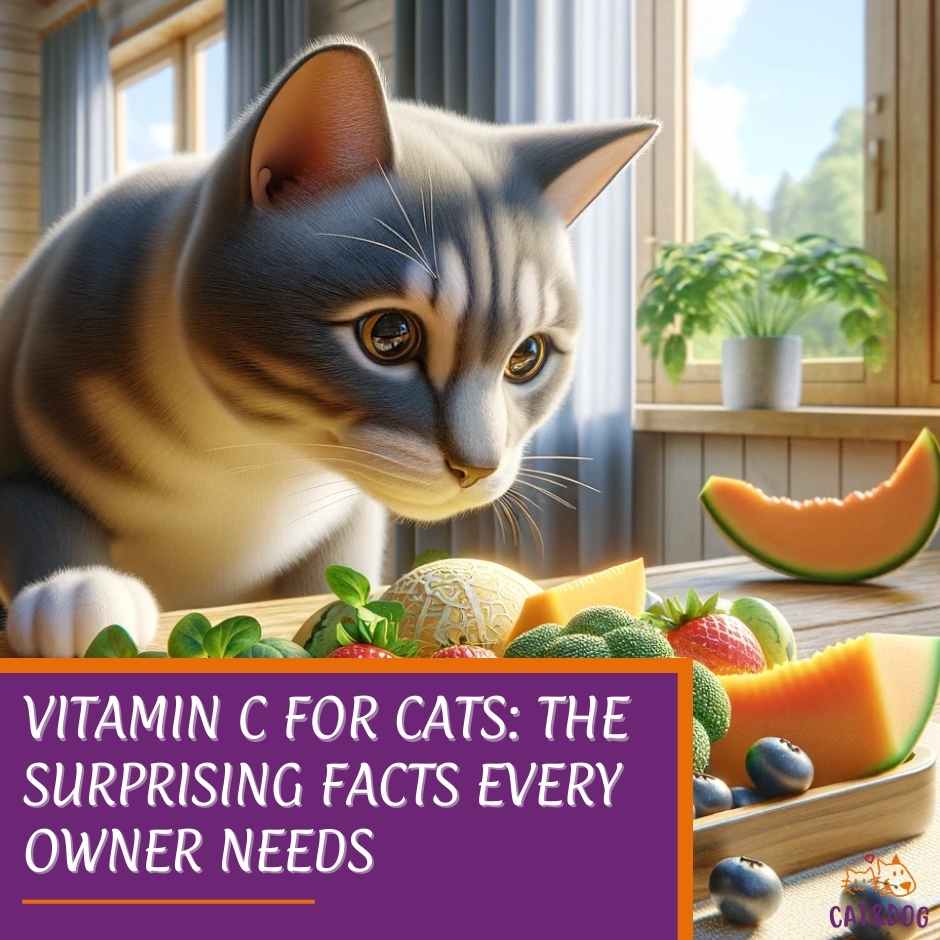When considering your cat’s nutrition, you may wonder about the role of vitamins in their diet—specifically, Vitamin C for cats.
Did you know that unlike us, our feline friends produce their Vitamin C?
That’s right, your cat synthesizes Vitamin C in their liver, which is pretty remarkable!

Yet, despite their body’s ability to create this essential nutrient, there are unique scenarios where your fluffy companion might benefit from a little extra boost.
Certain health conditions could increase the need for Vitamin C, and supplementary sources or diet adjustments may be suggested by your vet.
Of course, it’s not as simple as feeding your cat an orange—citrus isn’t cat-friendly!
But, rest assured, the pet food market and Nature’s Pantry offer cat-safe sources packed with the right amount of Vitamin C to support their health.
It’s all about balance and knowing when to add a bit more of this antioxidant-rich vitamin or when to let your cat’s natural biology do its thing.
Key Takeaways
- Cats naturally produce Vitamin C, but in specific cases, supplementation can be beneficial.
- Like all aspects of feline health, Vitamin C needs should be tailored to individual dietary and health requirements.
- Consultation with a vet is key to determining if your cat might need additional Vitamin C.
The Role of Vitamin C for Cats Towards Cat Health
Benefits and Functions of Vitamin C
Ever wondered what keeps your kitty’s skin supple and their bones strong? Vitamin C is your answer!
This vitamin is a superstar when it comes to: (1)
- Collagen Synthesis: Just like humans, your feline friends need collagen. It’s the protein that gives their skin elasticity and strength, their joints flexibility, and their bones durability. Vitamin C acts as a key player in making sure collagen production is on track. (2)
- Antioxidant Functions: Life is full of stress, right? For your cats, too! Vitamin C is like their personal bodyguard, protecting them from the oxidative stress caused by free radicals, which are harmful molecules that can damage cells. (3)
- Immune Health & Wound Healing: Sniffles aren’t fun for anyone, including your cat. Vitamin C boosts the immune system, helping your pet fight off those pesky germs and heal quicker if they get a cut or scrape. (4)
Natural Production of Vitamin C in Cats
Did you know your cat is a little vitamin factory?
Indeed, these adorable pets naturally produce Vitamin C in their liver.
However, this ability can vary based on several factors such as:
- Age: Senior cats may not be as efficient in vitamin production as their younger counterparts.
- Breed & Health: Some breeds or cats with specific health issues might face challenges in producing adequate amounts of Vitamin C.
So, keep an eye on your furry friend, and if you notice anything amiss, a quick chat with the vet could be just what the doctor ordered to ensure their vitamin levels are purr-fect!
Dietary Sources and Supplemental Needs
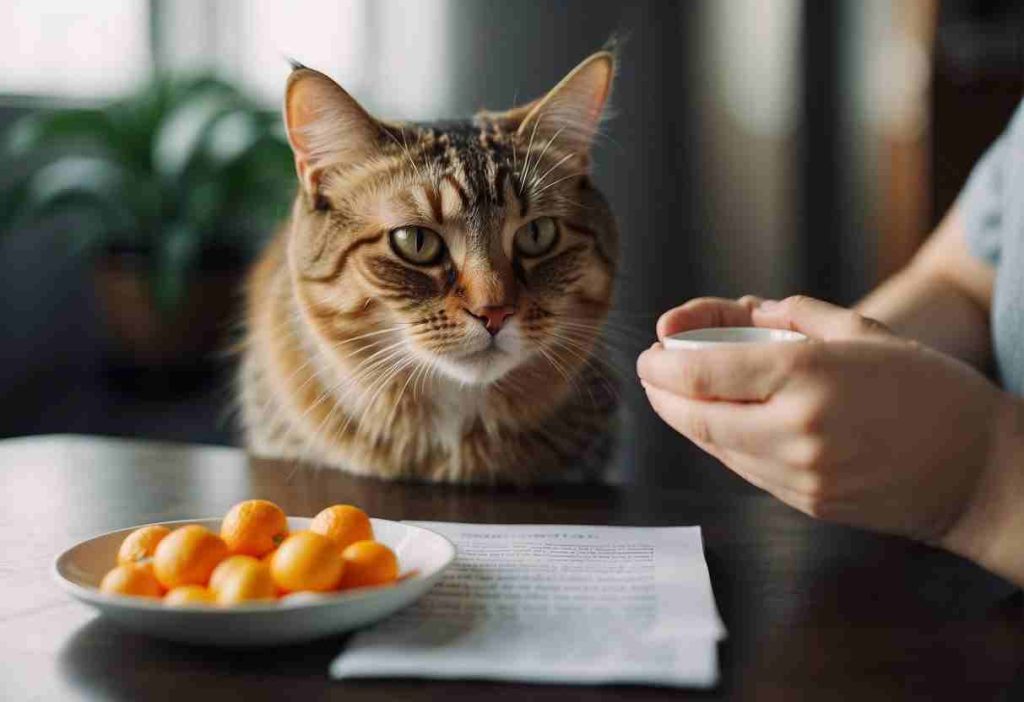
Vet-Approved Food Sources Rich in Vitamin C
You might wonder if your furry friend can enjoy the same fruits and vegetables you do. Great news!
Some vitamin C-rich foods are safe for cats and can be a healthy addition to their diet.
Just remember, moderation is key to preventing any tummy troubles. Here’s a quick list of cat-safe options:
- Strawberries: Just a small berry or two is plenty.
- Bell Peppers: A few small, chopped pieces will do.
- Leafy Greens: Such as spinach or kale, finely chopped.
When serving these snacks, keep them plain and free from any dressings or sauces.
When is Supplemental Vitamin C Necessary?
Cats usually produce enough vitamin C on their own, but there are times when they might need an extra boost.
If your cat has certain health conditions like a urinary tract infection, a vet might recommend supplements.
But hey, before you start any new supplements, it’s always best to have a chat with your vet.
Keep an eye out for these signs that could indicate a deficiency or, on the flip side, too much vitamin C:
- Deficiency signs: Lethargy or swollen gums. (5)
- Toxicity signs: Diarrhea or excessive urination. (6)
Remember, your cat’s health is unique, just like theirs. So, while it’s good to know your stuff, it’s always wise to leave the tough calls to the professionals—your vet.
Risks, Benefits, and Clinical Studies
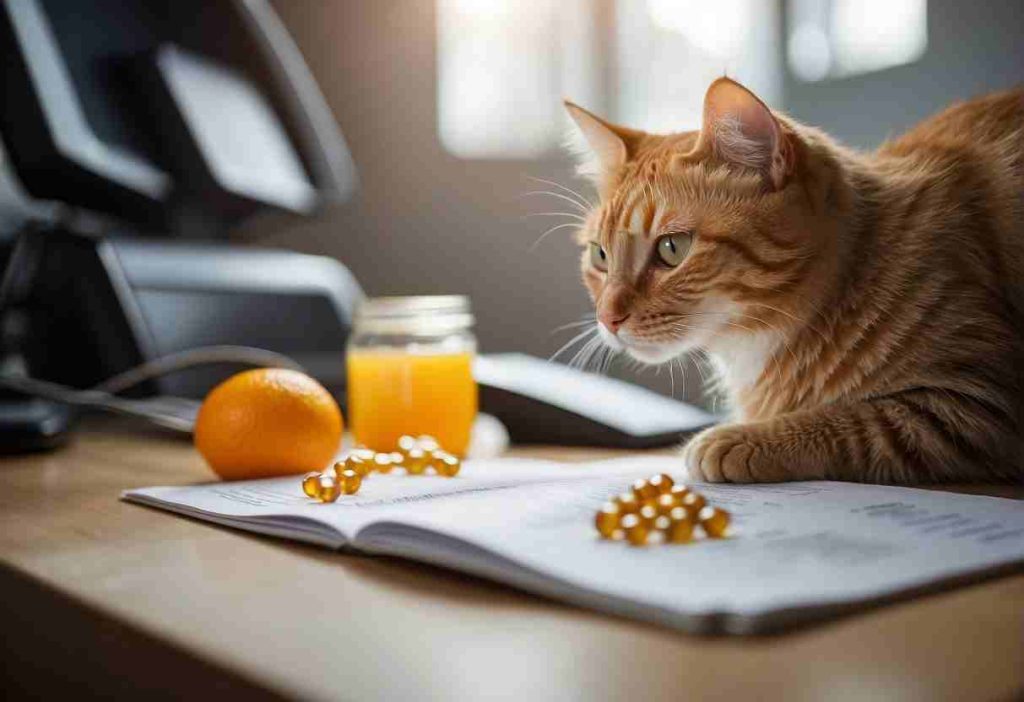
Potential Benefits and Risks of Vitamin C Supplementation
Benefits:
- Tissue growth and maintenance: You’ve got to wonder, how do these agile little creatures keep themselves in tip-top shape? Well, Vitamin C is one factor that plays a part in tissue growth and repair.
- Oxidative stress reduction: Like a mini superhero, Vitamin C takes on free radicals to help reduce oxidative stress.
- Immune function: Think of Vitamin C as your cat’s tiny, but mighty, shield against pesky bugs.
Risks:
- Gastrointestinal upset: Too much Vitamin C might leave your cat feeling queasy.
- Kidney stones: Just when you thought everything was purr-fect, too much of this vitamin may lead to kidney stones.
Insights from Clinical Studies and Research
- Limited data: While humans might have a plethora of evidence to sift through, we have just a scratching post’s worth for cats.
- Unknown risks and benefits: Most cats naturally produce enough Vitamin C, but studies have yet to reveal the full story behind supplementation for them.
| Food Source | Vitamin C Content |
|---|---|
| Broccoli (steamed) | 89 mg per 100 grams |
Remember that balance is key. Just like how you wouldn’t overdo it with catnip, it’s important not to go overboard with Vitamin C.
Keep it purr-operly balanced, and your feline friend should stay in the purr-fect health lane.
Expert Opinions and Real-World Scenarios
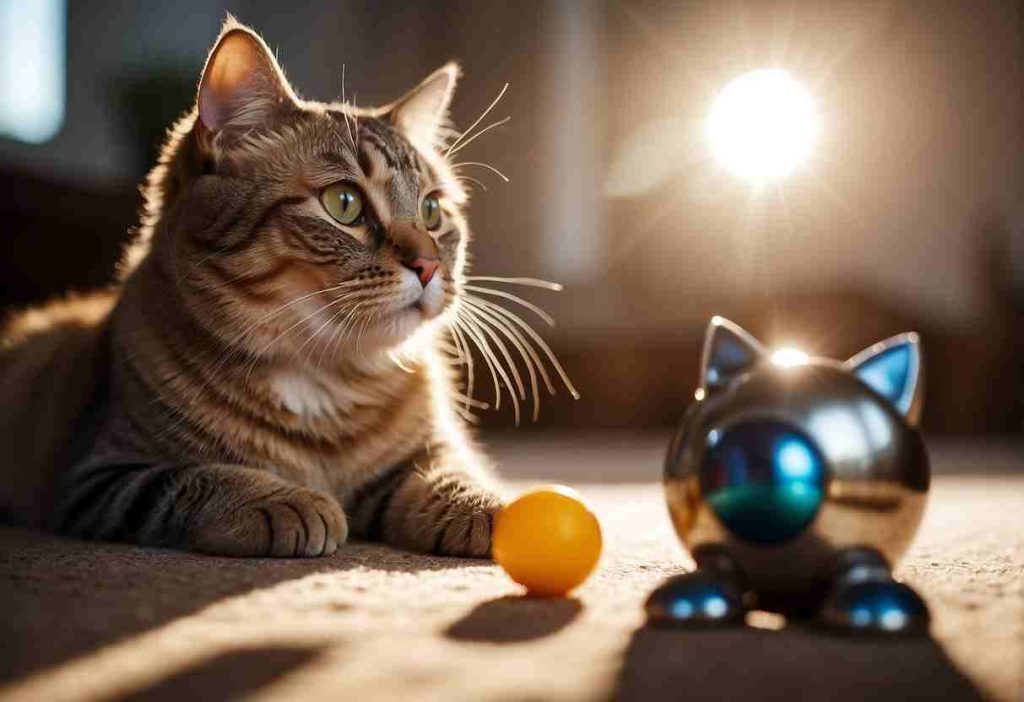
Have you ever wondered if your feline friend needs a Vitamin C boost? Well, let’s scratch the surface with some veterinary insights and see what those with whiskers on the ground have to say!
Veterinary Advice and Alternative Views
Did you know that unlike us, cats naturally produce Vitamin C in their bodies? So, many vets might ask, “Why supplement?” But some practitioners sing a different tune.
A veterinary nutritionist might suggest that in stressful situations, extra Vitamin C could support your kitty’s immune system.
On the flip side, excessive Vitamin C can lead to stomach upset in cats. Remember, balance is key, and there’s no one-size-fits-all answer.
Case Studies and Practical Examples
Let’s whisker through a real-world scenario. Sasha, a Siamese cat, was frequently ill. Her owner decided to try Vitamin C supplements, and voilà, an improvement in Sasha’s vitality was noted.
However, this is just one story, and anecdotes don’t equate to clinical advice.
In contrast, Max, a feisty Maine Coon, experienced diarrhea after his owner jumped on the Vitamin C bandwagon. It goes to show that results can vary, and what works for one might not suit another.
In conclusion, while Vitamin C for cats is a point of debate, any supplementation should always be approached with caution and under professional guidance. Got it? The tail-end of discussion!
Quick Recap
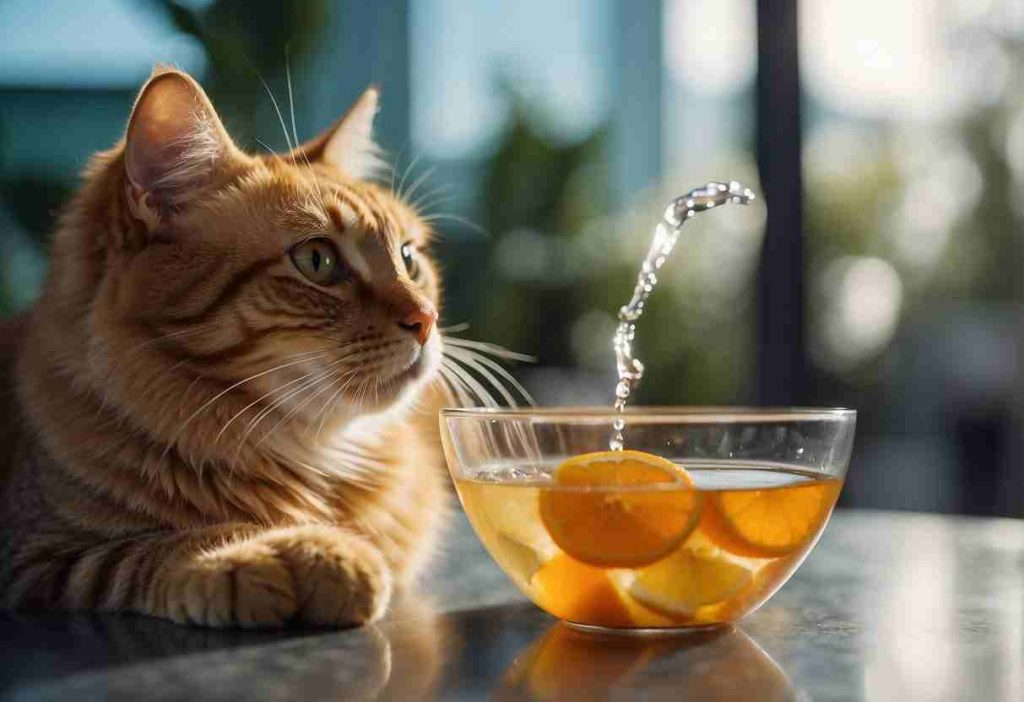
Here’s the scoop:
- Natural Production: Cats produce their Vitamin C, so they typically don’t need supplements like we do.
- Safe Treats: While they don’t need extra, certain treats like strawberries can be a healthy snack, packing about 58 mg of Vitamin C.
To keep this as simple as a cat’s life ought to be, let’s break down the essentials:
Vitamin C & Your Cat:
- Necessary? Your furry friend makes enough naturally for their needs.
- Supplements? Generally not required, but safe in proper amounts.
- Overdoing it? Too much Vitamin C could lead to health issues, so moderation is key!
Did you know that their supplement safety zone is similar to ours? It’s true! Just like us, they can have too much of a good thing. So, be smart with those vitamins.
Vitamin C Treats:
- Strawberries: A sweet, vitamin-rich snack (in moderation, of course).
And for the number lovers:
- 58 mg: The amount of Vitamin C in strawberries that your cat can enjoy safely.
Keep these tidbits in mind and your cat will be meowing with good health! Keep it balanced, and always check with the pros (a.k.a. your vet) before making any changes.
Happy and healthy purrs to you and your feline friend!
Frequently Asked Questions
Vitamin C in cats is a topic that raises plenty of questions. You want the best for your furry friend, and it’s important to understand how this essential nutrient affects their health.
Here’s a quick dive into the most common inquiries cat owners have.
What are the beneficial effects of giving Vitamin C to my feline friend?
While cats naturally produce Vitamin C, it plays a key role in their skin, muscle, and joint health.
However, it’s not usually necessary to supplement since they make enough on their own.
How do I determine the appropriate amount of Vitamin C to administer to my cat?
Consult your veterinarian for any vitamin supplementation. Your cat may not require additional Vitamin C beyond what they produce or receive in their regular diet.
Are there natural sources of Vitamin C that I can incorporate into my cat’s diet?
Yes, natural sources like strawberries contain Vitamin C along with other vitamins and minerals. They can be safe, occasional treats for your cat.
What are the signs of Vitamin C deficiency in cats?
Cats typically do not suffer from Vitamin C deficiency due to their ability to produce it themselves.
Any health issues should prompt a visit to the vet, rather than presuming a vitamin deficiency.
Is it safe to share my Vitamin C supplements with my kitty, and if so, how?
It’s best to not share human supplements with cats, as they have different dosage needs and tolerances.
Always consult a vet before giving your cat any human-grade supplements.
Are there any risks associated with giving my cat Vitamin C supplements?
Feeding your cat excessive amounts of Vitamin C can lead to health problems, so it’s crucial to follow veterinary advice when considering supplements.
Can too much Vitamin C be harmful to cats?
Yes, an excess of Vitamin C can potentially cause issues like digestive upset or even more serious conditions. Stick to vet-recommended guidelines to keep your cat safe.
- The Ultimate Overview to Actual Cash Gambling Establishments - July 1, 2025

